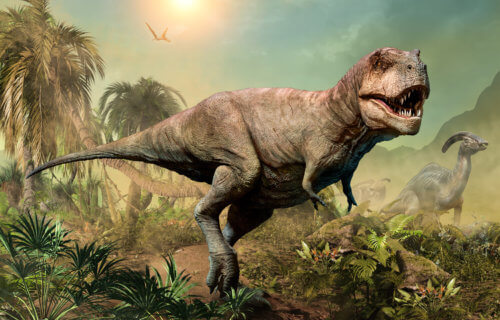BRISTOL, United Kingdom — Although the Tyrannosaurus rex may have had tiny arms, scientists have generally thought the king of dinosaurs had a pretty big brain — until now. Prior studies suggested that the T. rex (and most of its dinosaur cousins) was quite smart, having an intelligence roughly equivalent to that of a modern-day monkey. Now, however, researchers from the University of Bristol are challenging this belief. An international team of paleontologists, behavioral scientists, and neurologists now proclaim dinosaurs were only as smart as reptiles and failed to match the intelligence of mammals.
Researchers re-examined brain size and structure in dinosaurs to investigate this topic, concluding that the creatures behaved more like crocodiles and lizards.
A research project published in 2023 claimed that dinosaurs like the T. rex displayed exceptionally high numbers of neurons (brain cells) and were, therefore, more intelligent than most assumed. At the time, researchers said these high neuron counts could directly influence intelligence, metabolism, and life history, with scientists ultimately concluding that T. rex was rather monkey-like in some of its habits. Those researchers cited the cultural transmission of knowledge, as well as the use of tools, as potential examples of cognitive traits that dinosaurs may have possessed.
However, this latest research — involving the University of Bristol’s Hady George, Dr. Darren Naish (University of Southampton), Dr. Kai Caspar (Heinrich Heine University), Dr. Cristian Gutierrez-Ibanez (University of Alberta), and Dr. Grant Hurlburt (Royal Ontario Museum) — took a much closer look at the techniques used to predict both the brain size and number of neurons in dinosaur brains. This approach led to researchers concluding previous assumptions about brain size in dinosaurs and the number of neurons their brains contained were largely unreliable.

These findings come following decades of analysis that saw both paleontologists and biologists thoroughly examine dinosaur brain size and anatomy. The ensuing results helped researchers infer the behavior and lifestyle of these prehistoric beasts. Information pertaining to dinosaur brains came from mineral in-fillings of the brain cavity, called endocasts, in addition to the shapes of the cavities themselves.
The study authors note that the size of dinosaurs’ brains has been overestimated, particularly the forebrain, which means neuron counts were also overestimated. Moreover, the new study shows that neuron count estimates are not a reliable guide to intelligence anyway.
In order to reliably reconstruct the biology of long-extinct species, study authors argue, scientists must look at numerous lines of evidence, including skeletal anatomy, bone histology, the behavior of living relatives, and trace fossils.
“Determining the intelligence of dinosaurs and other extinct animals is best done using many lines of evidence ranging from gross anatomy to fossil footprints instead of relying on neuron number estimates alone,” explains Hady, from Bristol’s School of Earth Sciences, in a media release.
“We argue that it’s not good practice to predict intelligence in extinct species when neuron counts reconstructed from endocasts are all we have to go on,” Dr. Kai Caspar explains.
“Neuron counts are not good predictors of cognitive performance, and using them to predict intelligence in long-extinct species can lead to highly misleading interpretations,” adds Dr. Ornella Bertrand from the Institut Català de Paleontologia Miquel Crusafont.
“The possibility that T. rex might have been as intelligent as a baboon is fascinating and terrifying, with the potential to reinvent our view of the past,” concludes Dr. Naish. “But our study shows how all the data we have is against this idea. They were more like smart giant crocodiles, and that’s just as fascinating.”
The study is published in The Anatomical Record.
